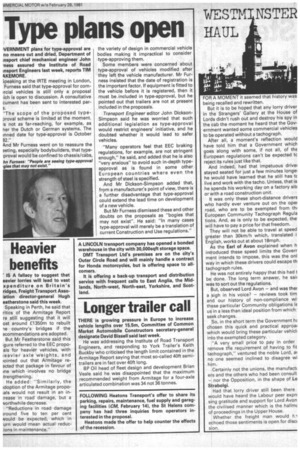Type plans open
Page 7

If you've noticed an error in this article please click here to report it so we can fix it.
VERNMENT plans for type-approval are no means cut and dried, Department of insport chief mechanical engineer John 'ness assured the Institute of Road insport Engineers last week, reports TIM AKEMORE.
>peaking at the IRTE meeting in London, Furness said that type-approval for cornvcial vehicles is still only a proposal iich is open to discussion. A consultative cument has been sent to interested pars.
'The scope of the proposed typeproval scheme is limited at the moment. is not as far-reaching, for example, as her the Dutch or German systems. The Inned date for type-approval is October 82."
And Mr Furness went on to reassure the aeting, especially bodybuilders, that type!provel would be confined to chassis/cabs, hn Furness: "People are seeing type-approval Pgles that may not exist," the variety of design in commercial vehicle bodies making it impractical to consider type-approving them.
Some members were concerned about type-approval of vehicles modified after they left the vehicle manufacturer. Mr Furness insisted that the date of registration is the important factor. If equipment is fitted to the vehicle before it is registered, then it must be included in type-approval, but he pointed out that trailers are not at present included in the proposals.
Transport Engineer editor John DicksonSimpson said he was worried that such additional legislation as type-approval would restrict engineers' initiative, and he doubted whether it would lead to safer vehicles.
"Many operators feel that EEC braking regulations, for example, are not stringent enough," he said, and added that he is also "very anxious" to avoid such in-depth typeapproval as is found in some other European countries where even the strength of steel is specified.
And Mr Dickson-Simpson added that, from a manufacturer's point of view, there is a further disadvantage that type-approval could extend the lead time on development of a new vehicle.
But Mr Furness dismissed these and other doubts on the proposals as "bogies that may not exist". He said: "In many cases type-approval will merely be a translation of current Construction and Use regulations."




























































































